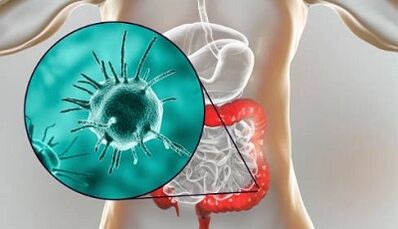
Parasitic diseases are an extensive group of diseases caused by helminths, some arthropods and protozoa.
Despite all the successes of modern medicine and the developed hygiene, at least 90% of people around the world are in their lives, according to statistics.You can find out from this article how you suspect the disease and which tests have to exist for parasites.
Types of parasites
Parasites are called organisms that survive due to the main activity of living things.Having settled in the human body, in the process of their growth and reproduction, they lead to a deficiency of trace elements, vitamins, proteins and other nutrients.They can lead to both relapses and exacerbations of chronic pathologies, damaging the internal organs on their own.
There are the following types of parasites that can cause disease in humans:
- Protozoen (amöben, Lamblia);
- pathogenic microorganisms (chlamydia, mycoplasma and others);
- Helminthen (ascarids, pinworms, bull and pork chain, etc.);
- Parasitic arthropods (scabies, Demodex).
The main feature of the pathologies they cause is a long-term asymptomatic or low-symptomatic course.Parasites skillfully hide their existence and try to push the owner out of the body until its reserves are exhausted and the organ or tissue is severely damaged.
Symptoms of parasitic diseases
Parasitic pathologies are most frequently intended to help helminthiasis - diseases caused by the presence of worms in the body.In most cases, they can be found in children, but can develop in adults with neglecting hygiene rules.Long after the infection, they do not manifest themselves in any way or are accompanied by inconspicuous symptoms that often remain without attention.

Each disease is characterized by certain characteristics, but there are also common signs:
- Headache, dizziness, increased weakness and fatigue.These phenomena are a consequence of intoxication as a result of poisoning with waste products of parasites.
- Exacerbation of bronchial asthma and allergic rhinitis, dermatitis, urticaria.They arise from increased sensitivity to helminth cells and their excretory products.
- Digestive system dysfunction (abdominal pain, nausea, vomiting, heartburn, constipation and diarrhea).Helminths parasitizing in the intestinal lumen lead to inflammation and intestinal obstruction by blocking the intestinal lumen.
- Anemia, vitamin deficiency, weight loss.Occurs due to a lack of proteins, vitamins and micro elements as well as reduced hormone production.
- Sleep disorders, chronic fatigue, irritability, nervousness, pain in muscles and joints.
In order to prove most types of helminthen, it is necessary to carry out a stool test or donate blood to determine the presence of specific antibodies.You can have the test carried out in a clinic at your place of residence, when admission to a hospital and in one of the private laboratories.Some medical centers offer a comprehensive examination in which you can diagnose the presence or lack of different types of parasites in the body.
Tests for parasites

The treating doctor will tell you based on the symptoms, the medical history and the clinical manifestations of the disease which tests you have to carry out if you suspect a parasitic illness.
The diagnosis begins with a general blood test.The most characteristic changes in helminthiasis are:
- Decreased hemoglobin levels and a decrease in the number of red blood cells (occurs due to protein and iron deficiency).
- An increase in the number of leukocytes, an acceleration of ESR (are signs of inflammation of the internal organs, especially the gastrointestinal tract).
- An increase in eosinophils (a characteristic sign of allergy that occurs in response to the irritating effects of helminth waste products).
For a more precise diagnosis, stool analyzes for worm eggs and swabs are carried out.When examining feces, you can detect pathogens of enterobiasis, ascariasis and hymenolipedosis, as well as the presence of protozoan microorganisms (giardia).
It is important to consider that with a single test the likelihood of discovering worm eggs in the feces is 30 %.Therefore, the study is carried out twice at intervals of 2-4 days to clarify the diagnosis in the first negative result.
To increase the accuracy of the study, it is important to carefully prepare the stool submission for analysis.Biological material should only be collected in a special sterile container available at a pharmacy.A few days before the test, you should avoid eating coloring foods (beets, red berries, exotic fruits, sweets and drinks with dyes) and do not use laxatives or rectal suppositories.
Immunoform analysis
Using the analysis of Elisa in adults and children, antibodies generated by the human body can be demonstrated in response to the presence of foreign bodies.For this purpose, blood is removed from a vein in which you can prove determined IgG antibodies in Giardia, trichomonades, pig and bull switchworm, trichinellah, echinococcus, toxocaris and pinwurms in a laboratory.With the help of this study, the presence of almost all parasites in the human body can be determined.
Preparing for the study is not complicated.It is necessary to take the analysis in the morning after 8-10 hours of starvation on an empty stomach.On the eve of the study, it is advisable not to take antibacterial and antihistamines, nor to eat allergens (honey, seafood, exotic fruits and red berries, nuts).Immediately before donating blood, experts recommend spending 10-15 minutes in the laboratory waiting room.
The results of the study will be known after 1-2 days.These studies are performed both as an initial diagnosis and as a control over treatment.
The timely detection and modern treatment of parasitic diseases avoid complications that are dangerous for health.





























